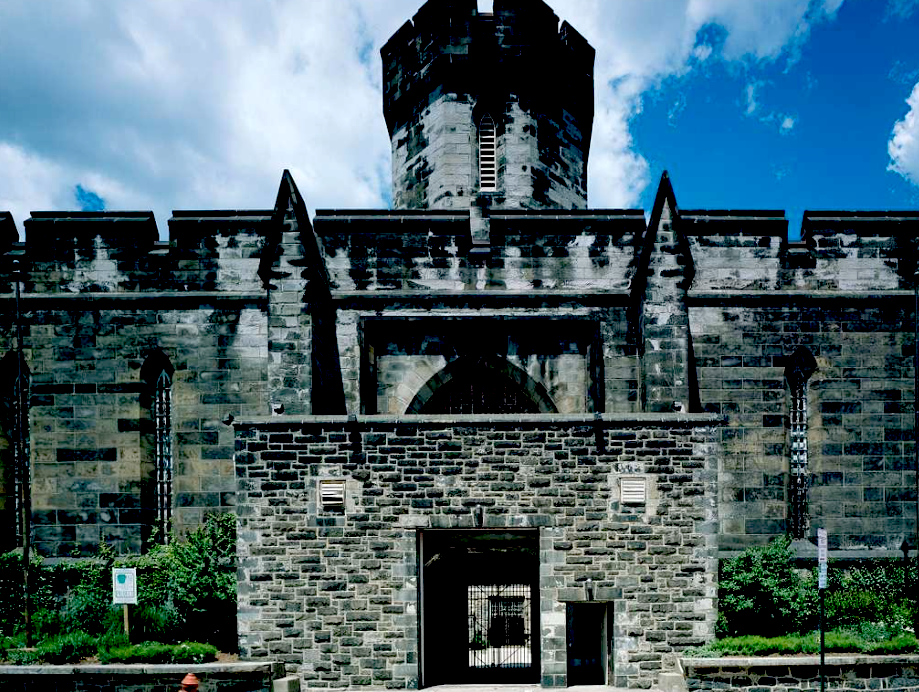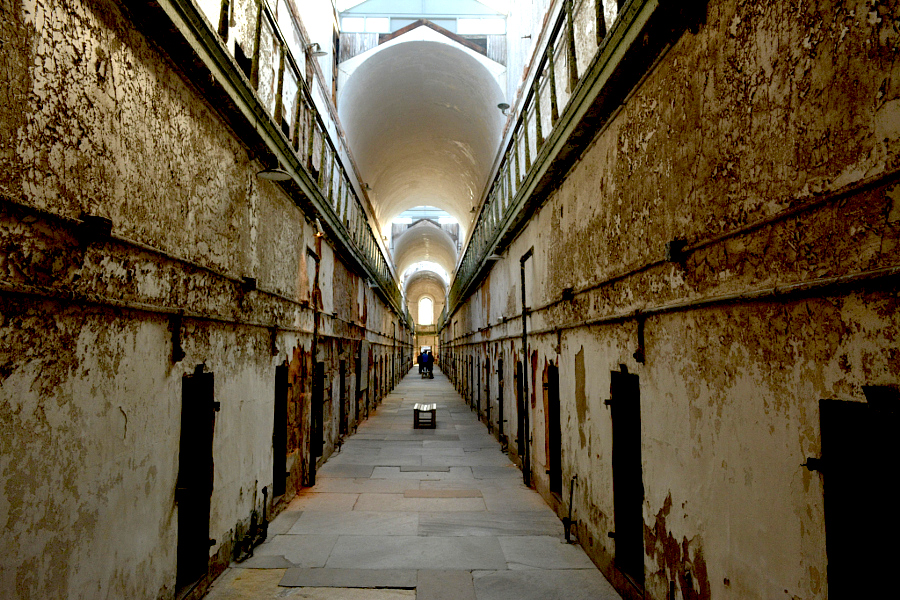The research on its effects on mental health is clear: Nothing good comes of solitary. It is a living example of the failure of the both the U.S. prison system and the U.S. mental healthcare system.

Display in The Lock Up museum in Newcastle, NSW, Australia. (Joe Lauria)
By John Kiriakou
Special to Consortium News
 Anthony Gay is severely mentally ill. And like many Americans who suffer from severe mental illness and who commit a crime, he was placed in solitary confinement after his conviction, rather than in a mental hospital where he could have received treatment for his schizophrenia.
Anthony Gay is severely mentally ill. And like many Americans who suffer from severe mental illness and who commit a crime, he was placed in solitary confinement after his conviction, rather than in a mental hospital where he could have received treatment for his schizophrenia.
Isolated in a 6-by-10 foot cell 24 hours a day, seven days a week, he spiraled into paranoia and began engaging in shocking self-mutilation. Gay stabbed himself in the eye with a razor blade. He cut off pieces of his own flesh and ate them. He cut out one of his own testicles and left it hanging on a cell door. He then stitched his scrotum closed with a zipper.
Instead of being transferred to a hospital, or even the prison’s mental health unit, Gay had time added on to his sentence, all of it in solitary. His seven-year sentence eventually became 97 years. What was his crime? He was convicted in 1993 of stealing a $1 bill and a hat. Gay was scheduled for release in 2093 until a judge finally recognized that the system had failed him. He was eventually released from prison and sent to a hospital, but not until he had spent 22 years in solitary.
Solitary confinement is the practice of isolating a prisoner from all human contact for an extended period of time. It is often used as a form of punishment or to control behavior, but it can have serious negative effects on mental health. Most countries around the world limit the time that a prisoner can spend in solitary to 15 days. The United States doesn’t.
There are scores of prisoners across the U.S. who have been in solitary for years and, in some cases, decades. It should be clear to everybody — the courts, the states, and the Federal Bureau of Prisons — that solitary only worsens already bad situations. It shouldn’t be in use.
We already knew that, of course. Solitary confinement as a punishment was invented in 1829 at Eastern State Penitentiary in Philadelphia. The idea was to build an imposing, neo-Gothic, escape-proof maximum-security penitentiary where every prisoner was kept in solitary confinement. Each tiny cell had nothing but a bed, a chair, a small table, a chamber pot and a Bible.
The idea was that if the prisoner had nothing to do with his time other than to read the Bible, he would be a good, law-abiding Christian man by the time he was released. Instead, everybody went insane.

Eastern State Penitentiary, a former prison in Philadelphia. (Carol M. Highsmith Archive, Library of Congress, Prints and Photographs Division)
There is a growing body of research that shows that solitary confinement as it is used today can cause a variety of severe psychological problems, including anxiety, depression, paranoia, hallucinations and suicidal thoughts. These problems can be so severe that they can lead to long-term disability or even death.
The Stories Are Consistent
A true account of the number of mentally-ill prisoners held in solitary confinement in the United States could fill a library. But the stories are generally consistent. The longer a person is held in solitary, the worse his mental state becomes. The younger a person is when he begins a sentence in solitary, the worse his mental state becomes. And the situation is usually hopeless when a person who is already mentally ill is placed in solitary whatever his age. It’s no wonder that the United Nations has declared the U.S. practice of solitary confinement to be a form of torture:

The ruins of a prison corridor in the Eastern State Penitentiary in Philadelphia. (Adithyavr, Wikimedia Commons, CC BY-SA 4.0 )
- Cesar Villa, a prisoner in the solitary confinement unit at Pelican Bay State Prison in California wrote in his 12th year in solitary, “Nothing can really prepare you for entering the SHU (Segregated Housing Unit). It’s a world unto itself where cold, quiet and emptiness come together, seeping into your bones, then eventually the mind. The first week I told myself: It isn’t that bad, I could do this. The second week, I stood outside in my underwear shivering as I was pelted with hail and rain. By the third week, I found myself squatting in a corner of the yard, filing fingernails down over coarse concrete walls. My sense of human decency dissipated with each day. At the end of the first year, my feet and hands began to split open from the cold. I bled over my clothes, my food, between my sheets. Band-aids were not allowed, even confiscated when found. My sense of normalcy began to wane…Though I didn’t realize it at the time — looking back now — the unraveling must’ve begun then. My psyche had changed — I would never be the same.”

Pelican Bay State Prison in California. (Jelson25, Wikimedia Commons, CC BY 3.0)
- Thomas Silverstein, who spent 28 years in solitary in the U.S. Penitentiary in Atlanta before dying there, wrote, “The cell was so small that I could stand in one place and touch both walls simultaneously. The ceiling was so low that I could reach up and touch the hot light fixture. My bed took up the length of the cell, and there was no other furniture at all…The walls were solid steel and painted all white…Shortly after I arrived, the prison staff began construction, adding more bars and other security measures to the cell while I was within it…It is hard to describe the horror I experienced during this construction process. As they built new walls around me it felt like I was being buried alive…Due to the unchanging bright artificial lights and not having a wristwatch or clock, I couldn’t tell if it was day or night. Frequently, I would fall asleep and when I woke up I would not know if I had slept for five minutes or five hours, and would have no idea of what day or time of day it was…I now know that I was housed there for about four years, but I would have believed it was a decade if that is what I was told. It seemed eternal and endless and immeasurable.”
- William Blake called his 25 years in solitary “a sentence worse than death,” and added, “I’ve experienced times so difficult and felt boredom and loneliness to such a degree that it seemed to be a physical thing inside—so thick it felt like it was choking me, trying to squeeze the sanity from my mind, the spirit from my soul, and the life from my body. I’ve seen and felt hope becoming like a foggy ephemeral thing, hard to get a hold of, even harder to keep a hold of as the years and then decades disappeared while I stayed trapped in the emptiness of the SHU world. I’ve seen minds slipping down the slope of sanity, descending into insanity, and I’ve been terrified that I would end up like the guys around me that have cracked and become nuts. It’s a sad thing to watch a human being go insane before your eyes because he can’t handle the pressure that the box exerts on the mind, but it is sadder still to see the spirit shaken from a soul. And it is more disastrous. Sometimes the prison guards find them hanging and blue; sometimes their necks get broken when they jump from their bed, the sheet tied around the neck that’s also wrapped around the grate covering the light in the ceiling snapping taut with a pop. I’ve seen the spirit leaving men in SHU and have witnessed the results.”
- In 2016, Kalief Browder killed himself after spending three years in solitary confinement at Rikers Island jail in New York City. Browder was 16 years old when he was arrested for allegedly stealing a backpack. He was never charged with a crime, but he was held in solitary while he awaited trial. Browder’s family said that he suffered from severe psychological problems while in solitary confinement, including anxiety, depression and paranoia.

Rikers Island in New York’s East River. (Doc Searls, Flickr, CC BY 2.0)
- And although less common, women also are held in solitary. Sarah Jo Pender spent five years in the Indiana Women’s Prison solitary confinement unit after a nonviolent prison escape. She wrote, “Women who enter sane will become so depressed that they shut down or hurt themselves. I watched a woman claw chunks of flesh from her cheeks and nose and write on the window with her blood. My neighbor bashed her head against the concrete until officers dragged her to a padded cell…Right across from my cell, a woman slit her own throat with a razor and was wheeled out on a gurney. Two others tried to asphyxiate themselves with bras and shoestrings. Now no one has shoestrings and we shuffle around in floppy tennis shoes with loose tongues .… Another woman cut her wrists using the metal band around a pencil eraser. Now, all our pencils are stripped naked. It is always the poor prisoner porter who is forced to clean up the blood puddles and shit smears left behind when someone’s mind spirals down the rabbit hole.”
The research on the effects of solitary confinement on mental health is clear: Nothing good comes of solitary. It causes or exacerbates serious psychological problems and frequently leads to long-term disability or even death. The United Nations condemns it and much of the rest of the world won’t practice it in their own prisons. It is a living example of the failure of the both the U.S. prison system and the U.S. mental healthcare system. Repairing those will take a great deal of time, money, and effort. But the very first step must be to end solitary confinement.
John Kiriakou is a former C.I.A. counterterrorism officer and a former senior investigator with the Senate Foreign Relations Committee. John became the sixth whistleblower indicted by the Obama administration under the Espionage Act — a law designed to punish spies. He served 23 months in prison as a result of his attempts to oppose the Bush administration’s torture program.
The views expressed are solely those of the author and may or may not reflect those of Consortium News.
Support CN’s Spring
Fund Drive Today


“Cruel and unusual punishment”
What else can this be?
Thanks John.
Have any MSM have been asked to publish this?
If solitary confinement is insane, why is it that nearly all American parents use it periodically to punish their children? “Go to your room and don’t come out until I tell you.” or “Go to your room – no supper for you young man!” or even “You’re grounded for the weekend.” are commonly heard in homes across America. Humans are, by nature, social animals. Being isolated is for most of us unpleasant. However, prisoners are bone fide anti-social humans, and at least sometimes, their violence must be isolated for the protection of prison staff and inmates.
Unfortunately, too many mentally-disordered humans do not get treatment because, by law, since the 70s at least, civil commitment is usually treated as involuntary imprisonment. Rather than re-think how we treat people who are violent because of mental disorders, it is easier for lawmakers to wait until the mentally-disordered break a law that justifies incarceration. Prisons are not mental hospitals with staff trained to treat psychiatric disorders. One consequence is often the overuse of solitary confinement.
Abuses such as those related in this article are unfortunate, but prison staff have to deal with dangerous behavior using what few tools states have provided. Until America is willing to bite the tax bullet and install psychiatric hospitals with enough capacity and safety to treat violent mentally-disordered individuals, it is hard to see much change in the use of solitary confinement.
“We thePeople of the United Sates, in order to form a more Perfect Union; establish Justice; ensure Domestic Tranquility: provide for the Common Defense, promote the General Welfare: and secure the Blessings of Liberty for ourselves and our progeny…”
Such great ideas , America. When can we put those ideas onto practice ?
Thank you, John, for writing this to remind me of just one more of the grave injustices of our so-called ‘civilization’ – this EXCEPTIONAL American society. It was hard to read and i had to force myself not to skip past it; but these truths must be told and repeated until we no longer allow such horrors to be done with our taxes.
It’s been seven years since Jean Casella, James Ridgeway and Sarah Shourd gave us “Hell Is a Very Small Place: Voices from Solitary Confinement,” exposing evils described by John Kiriakou.
The dust jacket of that book quotes President Barack Obama: “Do we really think it makes sense to lock so many people alone in tiny cells for twenty-three hours a day for months, sometimes for years at a time? That is not going to make us safer. It’s not going to make us stronger.”
Yet under Obama’s administration Kiriakou “became the sixth whistleblower indicted by the Obama administration under the Espionage Act” and “served 23 months in prison as a result of his attempts to oppose the Bush administration’s torture program” (from the introduction above). There seems to be a mismatch between Obama’s words and his deeds or omissions.
You say: “It is a living example of the failure of the both the U.S. prison system and the U.S. mental healthcare system.”
I’m afraid I cannot agree. It is a searing indictment of US society and a stain on us every bit as much as the torture program that you exposed and that landed you in jail when you did so.
Those with the most power are the ones who show the least grace, always remember a lion doesn’t concern itself with opinions of sheep, and sheep is what we have all become . . . .
As an afterthought our church leaders are very quiet on this matter?
“In 2016, Kalief Browder killed himself after spending three years in solitary confinement at Rikers Island jail in New York City. Browder was 16 years old when he was arrested for allegedly stealing a backpack. He was never charged with a crime, but he was held in solitary while he awaited trial. Browder’s family said that he suffered from severe psychological problems while in solitary confinement, including anxiety, depression and paranoia.”
No bail for allegedly stealing a backpack. This is incredible.
Did he already have these problems when he went in or did he develop them whilst incarcerated? Worth bearing in mind that he was African-American.
I seem to remember this shocking case from reading Nathan J. Robinson’s book: “Superpredator: Bill Clinton’s Use and Abuse of Black America”.
As a mother of a formerly incarcerated son, I’m especially familiar with the effects of solitary confinement and consider it a crime against humanity. It’s astounding how the US prison industrial system gets away with the torture it inflicts on human beings on a daily basis. The punitive mindset of the “Christian” narrative mentioned in this article about Eastern State Penitentiary is the theme of many policies in the US that create cruelty in the name of righteousness like no other. America is supposed to be a beacon of human rights, but is really a bastion of human wrongs. Profiting from the cruelty of incarceration is as wrong as it gets.
Thank you, John Kirikou, for bringing the personal stories regarding these hideous policies to light.
Don’t forget Jacob Chansley, the “QAnon Shaman.” Eleven months in solitary for embarrassing the government. Do murderers get that treatment? I think not.
Then they found out the government had concealed exculpating evidence. Capitol police had helped him find and enter the Senate floor. His conviction was bogus. They let him go to a halfway house.
It will continue to get worse, not better.
We now imprison political prisoners like the Jan 6 protesters and John Kiriakou. They are there to be severely punished and made an example to others.
And we have, unofficially, a two-tiered justice system. Some of it is racially based (as Biden’s 100-fold sentencing law for crack (Blacks use mostly) and powder cocaine.)
thehill.com/opinion/criminal-justice/540816-why-do-we-still-punish-crack-and-powder-cocaine-offenses-differently/
But mostly it is the Poor or at least the bottom 80% of incomes who often take plea bargains (90-95% of cases) because the alternative if convicted is much worse and they have cheap, disinterested lawyers.
Back when I was growing up and learning about this world, there was a public debate about ‘rehabilitation’ in prisons, and what seemed to be an understanding that since all but the worst murderers would be released back into society, then having them come back with some things like job skills and maybe some better social skills would be a good thing. Now we do the opposite, while at the same time we’ve expanded the prison system into the world’s largest. Yep, I’m sure that’s Democracy and Freedom that I smell. It just happens to smell just like the paper factory.
That report is unbearable to read, I had to skip parts because it is so depressing and sad and horriffic – and, as you say, INSANE!! I hope you or someone has a proposal for a law against it in the House or Senate or both. Is there one?
THE LEAST AMONG US: The Traumatized Mentally Ill
Wandering homeless in cities and a large percentage of of the prison population even before the vicious inhumanity of solitary.
Nearly half in prison are there for something drug related. Setting aside how much drugs should be illegal at all, the offenders are mostly there for dealing. Street level dealers do so to afford their own habits. They are blamed by conservatives for poor personal choices. Why yes! They should have chosen to be born to a family with a good income, in a nice neighborhood, with good schools, instead of to people who beat, raped, or psychologically abused them.
Anyone working with low income and homeless people knows that a dual diagnosis of mental illness and drug abuse isn’t unusual. Because of the rampant hysteria over drugs, seen as at least immoral if not evil, policy makers don’t understand the link between using and mental illness.
Addiction doesn’t happen because drugs are available. Sampling drugs every now and then isn’t any more likely to create an addict than a few beers makes an alcoholic. Addictions, including to gambling, shopping, or even sex, happen because they relieve unbearable psychological pain. The data on this is well-supported; read Dr. Gabor Mate’ on his experience with addicts and trauma And Dr. Bessel van der Kolk, the expert on PTSD.
There are few resources for the mentally ill, and only a tiny percentage of what’s there deals effectively with trauma, especially if rooted in childhood. Consider what would have to happen to prevent the all too common legacies of trauma. So the horror continues…
These reports: Stephen King couldn’t have written worse “horror” stories.
As i’ve said before; animals are better than humans.
People would be up in arms if an animal were treated the way humans in prison are.
Unfortunately, people do not visit factory farms. And the cruelty therein is hidden behind walls:
hxxp://traslosmuros.com/
And peta.org
John Kiriakou is very generous in calling the cruel & sadistic prison & “health” systems “failing.” Sadism is sadism.